Traditional Chinese Medicine expert shares health knowledge with you
Click below to follow for free↓↓↓
What is Liver Qi Stagnation?
Some friends often sigh, feeling a blockage in their chest and low spirits, suspecting they might have liver Qi stagnation. Is it possible? Yes, it is indeed possible! Unlike the heat symptoms of liver fire, liver Qi stagnation is characterized by Qi stagnation, emotional changes, and is also known as liver Qi depression syndrome. This condition arises from the liver’s failure to regulate and disperse Qi, leading to stagnation. Typical symptoms include depression, frequent sighing, fullness in the chest and flanks or lower abdomen, accompanied by wandering pain. Female patients may experience breast lumps, breast tenderness, irregular menstruation, and dysmenorrhea. Modern medical diagnoses often identify liver Qi stagnation symptoms in conditions such as chronic hepatitis, depression, menopausal syndrome, and mammary gland hyperplasia.

What Causes Liver Qi Stagnation?
This condition is often related to emotional factors and pathogenic influences. Emotional factors such as anger, depression, unfulfilled desires, or sudden psychological stress can lead to poor liver Qi circulation, causing stagnation and resulting in impaired liver function, which in turn triggers symptoms. Pathogenic factors may include blood stasis and phlegm, which obstruct the liver meridian, leading to Qi stagnation; or damage to the spleen and stomach, causing poor Qi circulation in the middle jiao, which also affects liver Qi.
5 Chinese Herbs for Smoothing Liver Qi and Relieving Pain in Liver Qi Stagnation
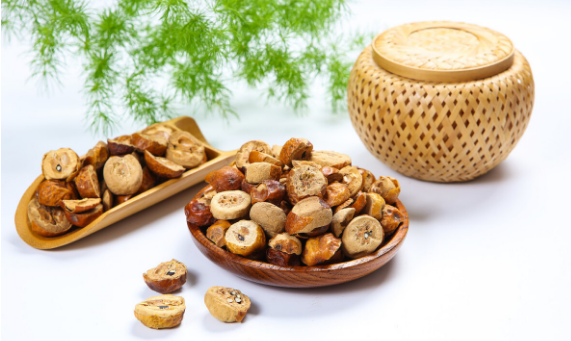
Chuan Lian Zi (Melia Toosendan) – Soothe the liver, clear heat, move Qi, relieve pain, expel parasites, treat skin diseases
Chuan Lian Zi is bitter and cold; it enters the liver, stomach, small intestine, and bladder meridians. This herb not only soothes the liver and clears heat but also moves Qi and relieves pain, treating liver Qi stagnation or liver-stomach disharmony, especially effective for heat-induced chest pain and liver-stomach Qi stagnation, known for its reputation as a “special medicine for hernias”. It also has the ability to expel parasites and relieve pain, suitable for abdominal pain caused by roundworms. Chuan Lian Zi is bitter and cold, and can treat skin diseases, including tinea capitis.
Patients with spleen and stomach deficiency, anemia, liver dysfunction, or gastrointestinal ulcers should avoid Chuan Lian Zi. It should not be taken in excessive amounts or for prolonged periods; caution is advised regarding the variety, as some places use bitter lianzi as a substitute, which can lead to poisoning.
Clinical combinations for smoothing liver Qi:
Chuan Lian Zi combined with Yan Hu Suo (Corydalis Yanhusuo), as in Jin Ling Zi San, can soothe the liver, clear heat, move Qi, and relieve pain, suitable for heat-induced chest pain and liver-stomach Qi stagnation;
Chuan Lian Zi combined with Sheng Di Huang (Rehmannia Glutinosa), Dang Gui (Angelica Sinensis), and Gou Qi Zi (Lycium Barbarum) can nourish Yin and blood, soften the liver, and relieve pain, suitable for long-standing chest and flank pain due to liver Qi stagnation transforming into heat, with Yin and blood deficiency;
Chuan Lian Zi combined with Huai Xiang (Foeniculum Vulgare), Wu Zhu Yu (Evodia Rutaecarpa), and Mu Xiang (Aucklandia Lappa), as in Dao Qi Tang, can move Qi, soothe the liver, dispel cold, and relieve pain, suitable for hernia pain due to excess cold and dampness;
Chuan Lian Zi combined with Xiang Fu (Cyperus Rotundus) can treat chest tightness and flank distension, breast tenderness, or menstrual irregularities caused by liver Qi stagnation.
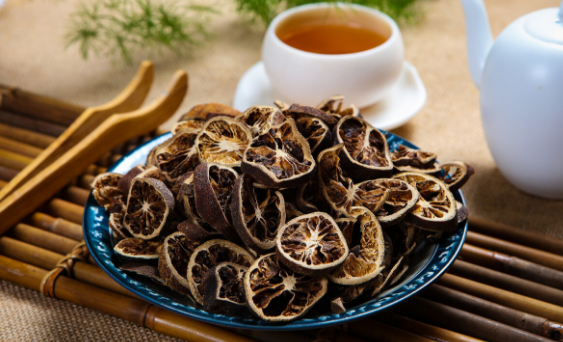
Qing Pi (Green Tangerine Peel) – Soothe the liver, break Qi, eliminate accumulation, and transform stagnation
Qing Pi is bitter and pungent, warm in nature; it enters the liver, gallbladder, and stomach meridians. This herb is effective in soothing the liver and breaking Qi, treating liver Qi stagnation with flank pain, breast tenderness or lumps, breast abscess, and cold hernia abdominal pain. It also disperses masses and eliminates stagnation, treating abdominal masses, chronic malaria, and food accumulation abdominal pain. Vinegar-fried Qing Pi is particularly effective in soothing the liver and relieving pain. However, caution is advised for those with Qi deficiency.
Clinical combinations for Qing Pi:
Qing Pi combined with Chai Hu (Bupleurum) and Yu Jin (Curcuma) can treat liver Qi stagnation with chest and flank distension;
Qing Pi combined with Chai Hu, Zhe Bei Mu (Fritillaria), and Ju Ye (Tangerine Leaf) can treat breast tenderness or lumps;
Qing Pi combined with Gua Lou Pi (Trichosanthes Fruit), Jin Yin Hua (Honeysuckle), and Pu Gong Ying (Dandelion) can clear heat and detoxify, treating breast abscess swelling and pain;
Qing Pi combined with Wu Yao (Lindera) and Xiao Hui Xiang (Foeniculum Vulgare), as in Tian Tai Wu Yao San, can treat cold hernia pain;
Qing Pi combined with Gui Zhi (Cinnamon Twig) and Chen Pi (Aged Tangerine Peel), as in San Pi Tang, can treat cold abdominal pain.
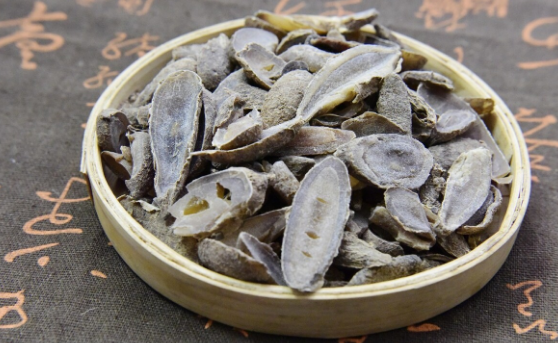
Yu Jin (Curcuma) – Invigorate blood, relieve pain, move Qi, resolve depression, cool the heart, and clear blood heat.
Yu Jin is pungent and bitter, cold in nature; it enters the liver, gallbladder, and heart meridians. This herb invigorates blood and Qi, relieving pain and treating chest, abdomen, and flank distension or stabbing pain, as well as pain due to Qi stagnation and blood stasis. It can also cool the heart and clear blood heat, used for vomiting blood, nosebleeds, and menstrual irregularities due to Qi fire rising. It awakens the spirit, benefits the gallbladder, and clears jaundice, suitable for liver and gallbladder damp-heat jaundice and gallstones. It is a key herb for invigorating blood, moving Qi, and cooling blood.
Care should be taken regarding dosage, form, and combinations to prevent Yu Jin toxicity; it should not be used with cloves due to pharmacological antagonism; those with Yin deficiency, blood loss, or without Qi stagnation and blood stasis should avoid it, and pregnant women should use it cautiously.
Clinical combinations for Yu Jin:
Yu Jin combined with Chai Hu, Bai Shao (White Peony), and Xiang Fu can be used for stabbing pain due to liver Qi stagnation;
Yu Jin combined with Gua Lou, Xie Bai (Garlic Chives), and Dan Shen (Salvia) can be used for chest pain due to heart blood stasis;
Yu Jin combined with Chai Hu, Zhi Zi (Gardenia), Dang Gui, and Chuan Xiong (Ligusticum) can be used for dysmenorrhea and breast distension due to liver Qi stagnation with heat and blood stasis;
Yu Jin combined with Bie Jia (Tortoise Shell), E Zhu (Curcuma), Dan Shen, and Qing Pi can be used for treating abdominal masses.
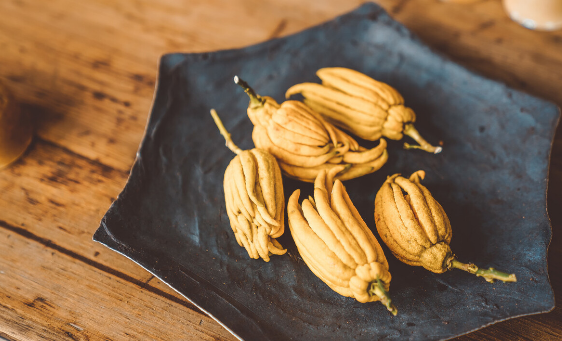
Fo Shou (Buddha’s Hand) – Soothe the liver, resolve depression, regulate Qi, harmonize the middle jiao, dry dampness, and transform phlegm.
Fo Shou is pungent, bitter, and sour, warm in nature; it enters the liver, spleen, stomach, and lung meridians. This herb is particularly suitable for liver-stomach disharmony or liver-spleen imbalance. It can be used for indigestion, chronic gastritis, early-stage liver cirrhosis, infectious hepatitis in children, and female dysmenorrhea, all related to liver Qi stagnation or liver-stomach disharmony, as well as abdominal distension, nausea, reduced appetite, chronic cough with phlegm, and chest pain. This herb is warm and dispersing, and caution is advised for those with Yin deficiency and heat, or Qi deficiency without stagnation.
Clinical combinations for Fo Shou:
Fo Shou combined with Qing Pi and Chuan Lian Zi can treat liver Qi stagnation and liver Qi invading the stomach;
Fo Shou combined with Mu Xiang and Zhi Ke (Bitter Orange) can treat lung Qi stagnation with chest tightness and spleen-stomach Qi stagnation;
Fo Shou combined with Ju Luo (Tangerine Peel), Si Gua Luo (Luffa), and Pi Pa Ye (Loquat Leaf) is very suitable for chronic cough with phlegm and chest and abdominal pain;
Fo Shou combined with Chen Pi enhances the ability to regulate Qi, dry dampness, and transform phlegm, treating spleen-stomach or liver-stomach Qi stagnation with excessive phlegm and cough.
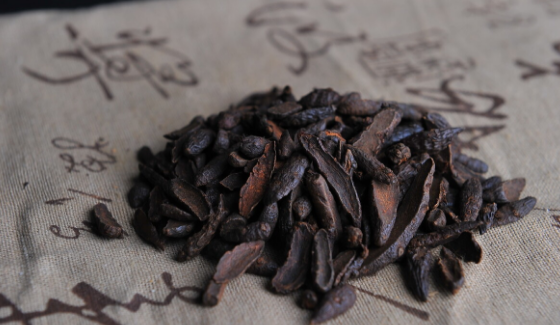
Xiang Fu (Cyperus) – Soothe the liver, resolve depression, regulate menstruation, relieve pain, and regulate Qi.
This herb is pungent, slightly bitter, and slightly sweet, neutral in nature; it enters the liver, spleen, and San Jiao meridians. It is primarily used for liver Qi stagnation with flank pain, abdominal pain, as well as menstrual irregularities, dysmenorrhea, mammary gland hyperplasia, chronic hepatitis, liver cirrhosis, gallstones, chronic gastritis, duodenal ulcers, and pelvic inflammatory disease, all related to liver Qi stagnation. As a general remedy for Qi disorders and a key herb in gynecology, Xiang Fu is also an essential medicine for regulating menstruation and relieving pain. Similar to other Qi-regulating herbs, caution is advised for those with Qi deficiency without stagnation, or Yin deficiency and blood heat.
Clinical combinations for Xiang Fu in treating liver Qi stagnation:
Xiang Fu combined with Gao Liang Jiang (Galanga) can be used for abdominal pain due to cold Qi stagnation and liver Qi invading the stomach;
Xiang Fu combined with Chai Hu, Chuan Xiong, and Zhi Ke can be used for flank distension and pain due to liver Qi stagnation;
Xiang Fu combined with Zi Su (Perilla) can balance Qi and blood, enhancing the ability to regulate Qi, relieve depression, move Qi, and eliminate distension, suitable for Qi and blood imbalance, chest and abdominal distension, and pregnancy-related nausea and abdominal distension;
Xiang Fu combined with Dang Gui can complement each other, enhancing the ability to soothe the liver and nourish blood, regulate menstruation, and relieve pain, suitable for stabbing pain in the chest and flanks, breast tenderness, menstrual irregularities, and lower abdominal distension.
Comparison of Xiang Fu and Chai Hu:
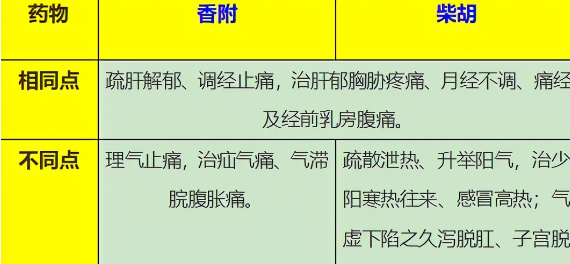
What Should Patients with Liver Qi Stagnation Pay Attention To?
Liver Qi stagnation is closely related to emotional stress and unfulfilled desires. Therefore, patients should maintain an optimistic mood, keep a relaxed mind, and focus on shifting their attention, avoiding getting stuck on any particular issue. Liver Qi stagnation can involve a wide range of conditions, particularly in gastrointestinal and gynecological diseases. It is generally not recommended for patients to self-medicate; instead, they should seek treatment under the guidance of a qualified practitioner to effectively improve and stabilize their condition. Through good daily management, patients should avoid rich, spicy, and cold foods, refrain from smoking and drinking, and actively cooperate with medication and follow-up examinations to aid in recovery.
Note: Some text and images in this article are sourced from the internet. The purpose of sharing this article is to convey more information. If there are any errors in source attribution or infringement of your legal rights, please notify us immediately, and we will delete it promptly and apologize.Previous Highlights:Lowering blood lipids and calming the mind to treat coronary heart disease, eight types of Chinese patent medicines containing Dan Shen.Three signs of excessive dampness in the body, four Chinese patent medicines to help you stay away from dampness and avoid obesity!Chinese medicine is a medicine with toxicity; seven commonly abused Chinese patent medicines should not be taken indiscriminately.Director Zhao’s popular science on health and wellness knowledge.
Click below to follow for free↓↓↓
Editor shares good articles with friends
1. Unclogging blood vessels, two Chinese herbs boiled in water, invigorate blood circulation, prevent heart attacks and strokes.
2. Six effective Chinese patent medicines for treating phlegm-damp cough, please choose according to your diagnosis.
3. Nine effective remedies for insomnia, the best medicine for sleep disorders.
Like is a form of encouragement Share to spread joy

